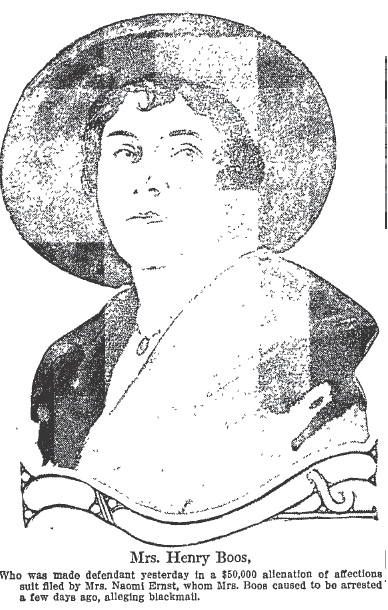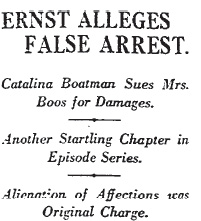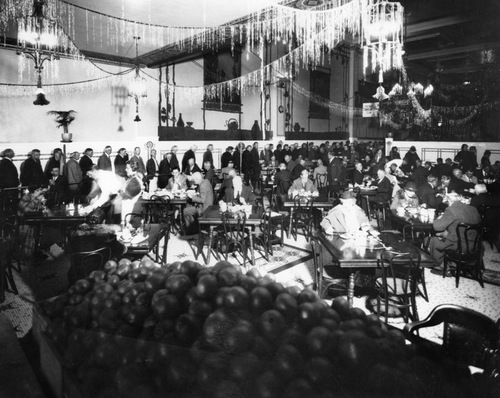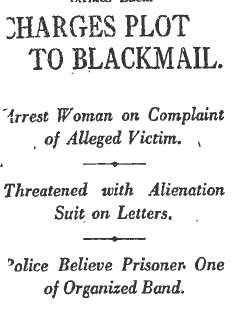 By early August 1916, Cassie Boos and Naomi Ernst had been locked in mortal legal combat for weeks. Cassie had accused Naomi of attempting to extort money from her; Naomi accused Cassie of trying to steal her husband from her. Neither woman seemed willing to give an inch, at least if what their attorneys told the reporters was true.
By early August 1916, Cassie Boos and Naomi Ernst had been locked in mortal legal combat for weeks. Cassie had accused Naomi of attempting to extort money from her; Naomi accused Cassie of trying to steal her husband from her. Neither woman seemed willing to give an inch, at least if what their attorneys told the reporters was true.
E.E. Ernst, the man in the middle of the embarrassing skirmish, was trying to diffuse the situation, or maybe he was just trying to get released from police custody, when he signed an affidavit denying that he or his wife were involved in a plot to blackmail Cassie Boos, and he also vehemently denied that Mrs. Boos had made an effort to alienate his affection from his wife.
Naomi won the first round when Judge Richardson sustained the demurrer to the complaint against her, in which she was accused of attempting to extort $15,000 from Cassie Boos. The judge’s action automatically dismissed the charge; however, it was stipulated that the prosecution could, if it desired, file an amended complaint.
It is difficult to say who blinked first, but on August 16, 1916, the Los Angeles Times reported that Cassie’s attorneys, Morton, Behymer, Craig and Salzman stated that an agreement had been reached by the waring parties, and that Mrs. Boos was going to withdraw the criminal complaint she’d filed against Naomi.
Maybe a good faith sign from Cassie was all the incentive Naomi needed to drop her suit too. Naomi even went so far as to admit that she’d been misled and deceived by a few of Cassie’s enemies who urged her to bring the suit. Who the enemies were and how they came across Naomi wasn’t revealed in the papers. Naomi (as her mother had earlier advised her to do) agreed to return to Cassie the letters that she had written to E.E. during the summer of 1915.
By the end of August 1916, the combatants had negotiated a peace treaty–but it lasted for only a couple of months.
 E.E. must have spent the time from August to October ruminating over the claims and counterclaims that had resulted in his arrest and seven day detainment in the City Jail–because on October 13, 1916 his attorney, Daniel M. Hidey, filed a false arrest suit against Cassie Boos on behalf of his client.
E.E. must have spent the time from August to October ruminating over the claims and counterclaims that had resulted in his arrest and seven day detainment in the City Jail–because on October 13, 1916 his attorney, Daniel M. Hidey, filed a false arrest suit against Cassie Boos on behalf of his client.
The newspapers took the opportunity to rehash some of the more humiliating moments of the alienation of affection claim against Cassie. To buttress her argument that Cassie had attempted to steal her spouse, Naomi had produced letters from Cassie to E.E. in which she addressed him as “The Duke of Catalina”, “My Sweetheart” and “My Dear”. A disclosure of this kind would have been bad enough for anyone, but for the wife of a wealthy and respected man it had to have been devastating.
Through his attorney E.E. stated that he had suffered damages amounting to $60,796 (equivalent to $1.3M in today’s dollars) due to his false arrest. He had spent seven days in jail where he declared he was made ill after being subjected to a “third degree” interrogation by detectives. Further, according to E.E., Cassie knew he was innocent when she swore to the complaint charging him with blackmail.
Daniel M. Hidey submitted an itemized list of damages to the court:
“Seven days in jail, lost time at $3 day, $21; legal counsel, $150, securing above sum he sacrificed property valued at $300; seventy-five days lost by reason of arrest, $225; illness caused by “third degree” required medical services, $100; injury to feeling and loss of pride, $10,000; general damages, $25,000; punitive damages, $25,000.”
Cassie Boos’ attorney, Ona Morton, issued a unequivocal denial of the charges, alleging Cassie was the victim of a conspiracy to extort money from her.
Mr. Morton said:
“Mr. Ernst has no just claim against Mrs. Boos for false arrest and we will show that, by his own statements, Mrs. Boos was fully justified in causing his arrest on the charge she did. There was no malice in the charge.”
Unfortunately, there was no further mention of the Ernst vs. Boos lawsuit in the L.A. Times so I don’t know if E.E. emerged triumphant. My guess is that the lawsuit went nowhere; I can’t imagine that the L.A. Times would not have reported on such a large settlement, if there had been one.
 I don’t know how E.E. and Naomi fared in the months and years following the lawsuits; but the Boos’ marriage survived another four decades beyond Cassie’s brief infatuation with “The Duke of Catalina”. Henry passed away at age 78 at his home on Plymouth Blvd in April 1957. He had retired in 1946. He was survived by his widow Cassie, brother Cyrus and four married sisters. Services for the cafeteria pioneer were conducted in Grace Chapel, Inglewood Park Cemetery.
I don’t know how E.E. and Naomi fared in the months and years following the lawsuits; but the Boos’ marriage survived another four decades beyond Cassie’s brief infatuation with “The Duke of Catalina”. Henry passed away at age 78 at his home on Plymouth Blvd in April 1957. He had retired in 1946. He was survived by his widow Cassie, brother Cyrus and four married sisters. Services for the cafeteria pioneer were conducted in Grace Chapel, Inglewood Park Cemetery.

![Boss Brother Cafeteria c. 1934 [Photo courtesy of LAPL]](https://derangedlacrimes.com/wp-content/uploads/2014/04/00008594_boos-bros-cafeteria.jpg)

